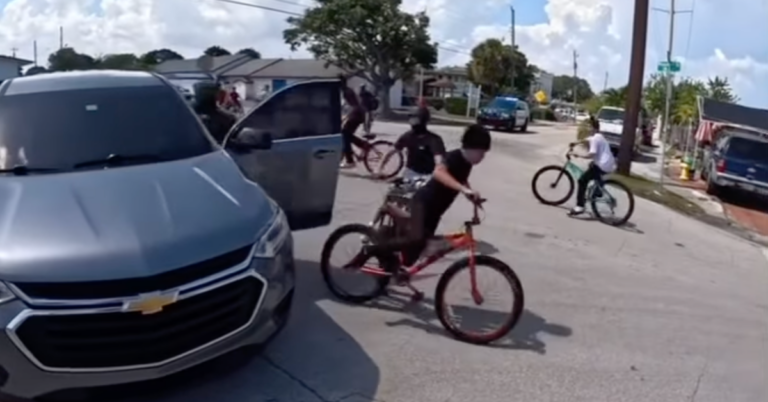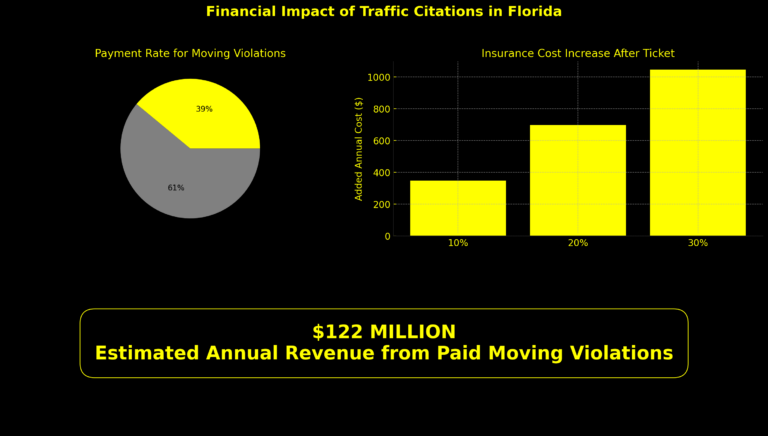The Move Over Law originated in 1994, when a paramedic in South Carolina was struck and injured while responding to an emergency situation roadside. Since then, all fifty states in the U.S. have adopted some version of a Move Over Law to protect emergency responders in the line of duty.
50 of the 50 United States currently have and enforce a Move Over Law. Though each state has some version of this law, the regulations surrounding them differ quite a bit. For instance, the Move Over Law in California simply requires drivers approaching stationary emergency vehicles to “slow down,” while Wyoming’s statute requires drivers “to merge into the lane farthest from the vehicle when traveling in the same direction, if safe to do so, or to slow to a speed that is 20 miles per hour less than the posted speed limit.”
So, with so many variations, how should drivers interpret the Move Over Law in the state of Florida?
What is the Move Over Law in Florida?
The Move Over Law in the state of Florida, also known as Florida Statute 316.126, was passed in 2002 and requires drivers to respect emergency vehicles giving audible or visible signals both en route to emergencies and stationary while assisting emergencies on the side of the road.
When approaching or being approached by an emergency vehicle that is en route to an emergency, drivers must immediately vacate any intersection, travel to the closest edge of the roadway, and stop until the vehicle has passed.
When passing a stopped emergency vehicle on the side of a roadway of two or more lanes, drivers must vacate the lane closest to the stopped vehicle(s) and slow to a speed less than 20 miles per hour less than the speed limit (or, if the speed limit is 20 miles per hour or below, slow to a speed of 5 miles per hour). When passing a stopped emergency vehicle on a single-lane road, or if unable to change lanes on a roadway of two or more lanes, the driver must slow speeds by the same quantities.
Pedestrians must also recognize the Move Over Law by yielding to emergency vehicles until they have passed and otherwise adhering to the right of way (unless directed to do otherwise by a law enforcement officer).
This statute also requires the DMV to provide educational campaigns to ensure the public is informed about the Move Over Act.
What constitutes a violation of the Move Over Law?
Because the Florida Move Over Law is rather all-encompassing, there are many ways to violate this statue and receive a ticket. Common violations include speeding past or failing to slow down when approaching an emergency vehicle, failing to move out of the way of an approaching emergency vehicle, or traveling too closely to a stopped emergency vehicle on the side of the road.
Drivers can receive tickets for any of these violations, regardless of the damage caused by their actions or lack thereof. However, if any of these actions cause harm to fellow drivers or emergency vehicles or personell, the violation will be much worse.
What emergency vehicles does this apply to?
The Move Over Law in Florida applies to all emergency vehicles displaying either visual or auditory signals (like flashing lights or sirens) or in the act of providing emergency assistance. This includes tow trucks, first responder vehicles and police.
What happens if you do not obey the Move Over Law?
Penalties for violating the Florida Move Over Law differ based on severity. This type of violation is considered a “noncriminal traffic infraction.”
In general, drivers who violate this statute can expect to pay a fine of at least $120 and incur three points on their driving record. These penalties may increase if the driver has already received multiple points on their record or has violated the same statue in the past. Additionally, drivers who fail to obey the Move Over Law and cause harm or damage as a result will receive heftier punishments.
Can you fight this ticket?
If you have received a ticket for violating the Florida Move Over Law, you do have options.
Your first course of action should be to hire an attorney with experience in traffic tickets. This will help you build your case and have the best possible chance of fighting the ticket and winning in court. Once you have explained your case to an attorney, they can assist you in building a proper defense.
Some defenses can include an unsafe situation preventing the driver from moving lanes or slowing speeds, lack of or improper notice from the emergency vehicles, or attempting to prevent further damage that would be caused by adhering to the Move Over Law.
If you are looking to fight a Move Over Law ticket in Florida, call The Ticket Clinic for a free consultation at 1-800-CITATION (1-800-248-2846) or hire us online. Our experienced traffic lawyers have resolved over 3,000,000 traffic offenses nationwide since 1987.



